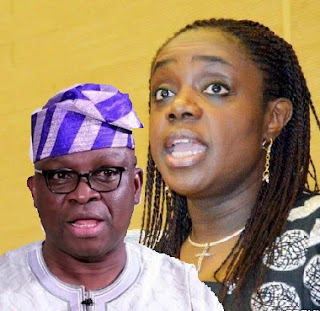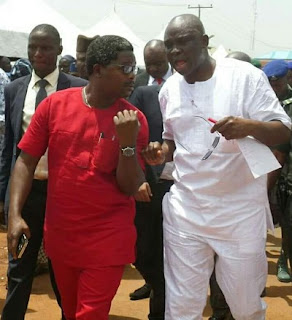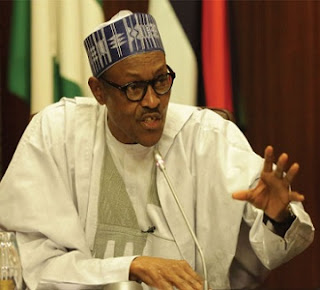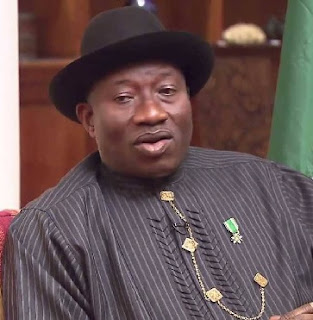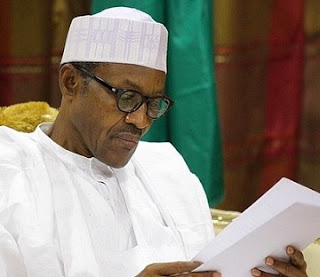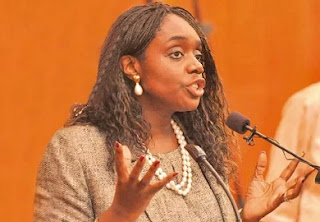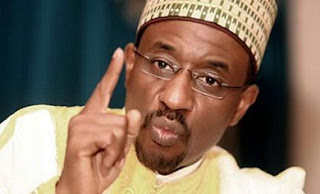RECESSION: Nigeria's Economy Closes To Rebound - Emir Sanusi Confirms; Hails FG, CBN On Measures, Faults Finance Minister
Mrs. Kemi Adeosun, the Finance Miniter had proposed cut in interest rate as part of measure to the current recession
Sanusi also expressed optimism that the Nigerian economy was on the right path and would rebound.
The emir said this at the launch of the
Nigerian Banking Report 2016 by Afrinvest West Africa Limited titled “Search for Investor Confidence” in Lagos.
The MPC held the MPR at 14 per cent, with an asymmetric window at +200 and -500 basis points at the end of its September meeting. The CBN also maintained banks’ Cash Reserve Requirement (CRR) at 22.5 per cent and the Liquidity Ratio (LR) at 30 per cent.
The decision by the MPC to retain the policy rate went against the call by the Minister of Finance, Mrs. Kemi Adeosun, who on Monday called for a reduction of the MPR in order to lower the cost of borrowing for government, individuals and businesses.
But this was rejected by the MPC on the grounds that it could worsen inflation in an environment of low productivity and could deter foreign investors who had started to show renewed interest in Nigerian financial assets, following the liberalisation of the foreign exchange market three months ago.
CBN Governor, Mr. Godwin Emefiele, said at the weekend that about $1 billion had been staked on fixed income securities by foreign investors since the central bank lifted the peg on the naira.
Sanusi said: “To be honest, when the fiscal authorities and many people in the private sector said they wanted a lower interest rate, I was concerned that the central bank would succumb to pressure. The fact that the central bank did not, shows that the central bank is beginning to reclaim its independence, which to me is a very good thing.
“I was very pleased with the MPC. In fact, I was waiting for the outcome of the meeting. When the central bank said they are not bringing the interest rate down, then I said ‘yes’, that is what I like to see. These are economic issues and you make choices.
“As an interested party and a former central banker, I can see why the central bank was not willing to reduce the interest rate at this point in time. If you lower the MPR by 100 or 200 basis points (bps), it is not going to lead to a rapid increase in credit growth. You will not see an increase in credit growth that would reverse the downward trend in output by lowering MPR by 100 or 200 bps.
“You would however further fuel inflation and you would reduce the yields on fixed income securities at a time when you are trying to attract foreign exchange.
“The immediate oxygen that this economy needs is foreign exchange and portfolio investors are important.”
He urged Nigerians to be patient and expressed optimism that the Nigerian economy would rebound.
According to him, “The last two or three MPCs ago, as far as I was concerned, the central bank got the decisions right by going to a flexible exchange rate and by tightening monetary policy.”
He pointed out that the naira is currently undervalued just like most stocks on the Nigerian Stock Exchange (NSE), but fixed income securities were offering high yields.
“Now, do we really have a flexible exchange rate? That is what we need to look at. These things require courage because some of the decisions you would take would seem to fly in your face in the first week or two.
“So, what does that tell you? If you allow people to actually come in with their dollars and sell at whatever rate, people want to buy and people see that they are going to make money on fixed income, or on equities and on currency appreciation, you will have liquidity in the market.
“Now, so long as you don’t allow that, you are not going to have the flows that you want. It is the inflow of dollars into the economy that would move the naira towards its fair value and for it to get to where you want it to be.
“It is not by fiat. The market does not accept orders. You don’t sit down and say where you want the naira to be. It would never happen because it has never happened.
“They tried that in Ghana, we have seen it in Venezuela, we also saw it in Zimbabwe. If you don’t have dollars in the system, your naira is weak, simple!
“So, the question is, how do you attract dollars? Now, are portfolio investors the final solution? No, they are not.
“But anyone who thinks that a long-term investor is going to take a 10-15-year risk in an economy where we don’t get short-term macroeconomic decisions right is wasting his time.
“You have to have the macro right. You are not going to have the IMF or World Bank or even banks invest in your bonds, because they are looking at the huge gap in macroeconomic decisions,” he added.
According to him, the past three months had been a learning process for policy makers in the country, adding that there had been a retracing of steps.
The Kano emir also expressed satisfaction that in the past few days, there had been a lot of conversation around the economy, adding that that is what is required in a nation in crisis.
“What we need to do is to understand what exactly is the macroeconomic framework within which to operate and what we seek to achieve as a nation.
“The central bank keeps high the rate of interest and it is very clear in its mind that it is keeping these rates up in order to keep yields high so as to attract dollars and with that help stabilise the currency.
“Greater inflow of dollars would help reverse step-by-step, all the missteps that had been taken in the last 18 months and get capital back.
“We need to encourage the central bank to have the courage to take that risk of implementing that document of actually going into that flexible exchange rate. Let the market work for two or three weeks and see how it will perform and you are going to have a gradual narrowing of the gap between the interbank and the parallel market rates and more liquidity in the system,” he said.
He also advised the federal government to sell down some national assets in a manner that does not hurt its strategic interest.
“We need to sell down some oil assets and sell down some refineries in a transparent manner that gives you value. You can even have the option of buying back later. But basically it helps you raise revenue,” the former CBN governor said.
Earlier, during a panel session, Prof. Pat Utomi said it had become the tradition that a new government in the country would allow things to get worse before they learn rather than building a consensus that allows the country to forge development that is sustainable.
He stated that Nigeria has a crisis of leadership. “We must be able to show a clear game plan, with some critical elements of industrial policy in areas of competitive advantage, which would be self-explanatory and attractive to investors.
“Government must be responsive to signals and not let things go out of hand before seeking out solutions and these have eluded successive governments,” Utomi said.
Also, the CEO of the Economic Associates, Dr. Ayo Teriba, pointed out that Nigeria was facing its economic challenges because of its over dependence on inflows from portfolio investors and export proceeds.
“We must learn from India that relies heavily on Diaspora remittances, which are directly invested on sovereign assets, thus providing the needed foreign exchange. We must broaden the focus, not only on foreign investors, but with confidence building policies to attract the Diasporans,” he added.
Other Experts Back CBN
Other than Sanusi and the panellists at the forum held by Afrinvest, several other international and local financial experts also threw their weight behind the CBN’s decision to leave the MPC unchanged.
Staunchly supporting the CBN’s action, financial experts and market analysts contended that the decision would ensure continued foreign inflows which, according to them, was what the country needed most at this time to pull it out of economic recession.
An economist at Exotix Partners, a leading investment firm for frontier and illiquid markets based in the United Kingdom, Alan Cameron, supported the CBN’s decision, describing it as one of the regulator’s “most sensible statement in months (and) one clear about the mandate and policy limitations”.
He believed that the naira was no longer over-valued, but rather at fair value on a real effective exchange rate basis – or perhaps significantly below (325-350 locally).
He said it would take another three to six months of high nominal yields before some cuts in 2017, if external dynamics continue to improve, noting that the MPC statement “should be confidence-building, albeit from a rather low level”.
Similarly, Senior Macroeconomic Specialist at Ecobank International, London, Gaime Nonyame, supported the rate retention by the banking system regulator.
She said the CBN could not reduce the policy rate because of inflation and could not afford to increase it because the country was already in recession.
This, she insisted, would not be desirable and encouraging to investors, who are expected to bring in the much-needed foreign currency, which Nigeria needs to get out of recession.
Also, analysts at the foreign currency trading and investment arm of Diamond Bank Plc, Uyi Ohenhen, lauded the CBN’s action. He said it was a positive development that triggered the inflow of funds into the foreign exchange market wednesday.
One of the economists that spoke with Reuters also praised the CBN for shrugging off political pressure.
“CBN’s refusal to bow to government pressure was a notable sign of the institution’s independence,” said John Ashbourne of Capital Economics.
A Senior Analyst at Delta Investments, Mr. Ken Halim, said: “The CBN’s decision was generally in line with analysts’ expectations. I would have been surprised if the CBN had cut interest rates given that the most serious challenge facing the country at the moment is the forex issue.
“Dollars are still very scarce and companies are shutting down because they can’t access FX. Cutting interest rates would have been counter-productive and discouraged foreign investors from investing in treasury bills and bonds.”
Mrs. Kemi Adeosun, the Finance Miniter had proposed cut in interest rate as part of measure to the current recession
Sanusi also expressed optimism that the Nigerian economy was on the right path and would rebound.
The emir said this at the launch of the
Nigerian Banking Report 2016 by Afrinvest West Africa Limited titled “Search for Investor Confidence” in Lagos.
The MPC held the MPR at 14 per cent, with an asymmetric window at +200 and -500 basis points at the end of its September meeting. The CBN also maintained banks’ Cash Reserve Requirement (CRR) at 22.5 per cent and the Liquidity Ratio (LR) at 30 per cent.
The decision by the MPC to retain the policy rate went against the call by the Minister of Finance, Mrs. Kemi Adeosun, who on Monday called for a reduction of the MPR in order to lower the cost of borrowing for government, individuals and businesses.
But this was rejected by the MPC on the grounds that it could worsen inflation in an environment of low productivity and could deter foreign investors who had started to show renewed interest in Nigerian financial assets, following the liberalisation of the foreign exchange market three months ago.
CBN Governor, Mr. Godwin Emefiele, said at the weekend that about $1 billion had been staked on fixed income securities by foreign investors since the central bank lifted the peg on the naira.
Sanusi said: “To be honest, when the fiscal authorities and many people in the private sector said they wanted a lower interest rate, I was concerned that the central bank would succumb to pressure. The fact that the central bank did not, shows that the central bank is beginning to reclaim its independence, which to me is a very good thing.
“I was very pleased with the MPC. In fact, I was waiting for the outcome of the meeting. When the central bank said they are not bringing the interest rate down, then I said ‘yes’, that is what I like to see. These are economic issues and you make choices.
“As an interested party and a former central banker, I can see why the central bank was not willing to reduce the interest rate at this point in time. If you lower the MPR by 100 or 200 basis points (bps), it is not going to lead to a rapid increase in credit growth. You will not see an increase in credit growth that would reverse the downward trend in output by lowering MPR by 100 or 200 bps.
“You would however further fuel inflation and you would reduce the yields on fixed income securities at a time when you are trying to attract foreign exchange.
“The immediate oxygen that this economy needs is foreign exchange and portfolio investors are important.”
He urged Nigerians to be patient and expressed optimism that the Nigerian economy would rebound.
According to him, “The last two or three MPCs ago, as far as I was concerned, the central bank got the decisions right by going to a flexible exchange rate and by tightening monetary policy.”
He pointed out that the naira is currently undervalued just like most stocks on the Nigerian Stock Exchange (NSE), but fixed income securities were offering high yields.
“Now, do we really have a flexible exchange rate? That is what we need to look at. These things require courage because some of the decisions you would take would seem to fly in your face in the first week or two.
“So, what does that tell you? If you allow people to actually come in with their dollars and sell at whatever rate, people want to buy and people see that they are going to make money on fixed income, or on equities and on currency appreciation, you will have liquidity in the market.
“Now, so long as you don’t allow that, you are not going to have the flows that you want. It is the inflow of dollars into the economy that would move the naira towards its fair value and for it to get to where you want it to be.
“It is not by fiat. The market does not accept orders. You don’t sit down and say where you want the naira to be. It would never happen because it has never happened.
“They tried that in Ghana, we have seen it in Venezuela, we also saw it in Zimbabwe. If you don’t have dollars in the system, your naira is weak, simple!
“So, the question is, how do you attract dollars? Now, are portfolio investors the final solution? No, they are not.
“But anyone who thinks that a long-term investor is going to take a 10-15-year risk in an economy where we don’t get short-term macroeconomic decisions right is wasting his time.
“You have to have the macro right. You are not going to have the IMF or World Bank or even banks invest in your bonds, because they are looking at the huge gap in macroeconomic decisions,” he added.
According to him, the past three months had been a learning process for policy makers in the country, adding that there had been a retracing of steps.
The Kano emir also expressed satisfaction that in the past few days, there had been a lot of conversation around the economy, adding that that is what is required in a nation in crisis.
“What we need to do is to understand what exactly is the macroeconomic framework within which to operate and what we seek to achieve as a nation.
“The central bank keeps high the rate of interest and it is very clear in its mind that it is keeping these rates up in order to keep yields high so as to attract dollars and with that help stabilise the currency.
“Greater inflow of dollars would help reverse step-by-step, all the missteps that had been taken in the last 18 months and get capital back.
“We need to encourage the central bank to have the courage to take that risk of implementing that document of actually going into that flexible exchange rate. Let the market work for two or three weeks and see how it will perform and you are going to have a gradual narrowing of the gap between the interbank and the parallel market rates and more liquidity in the system,” he said.
He also advised the federal government to sell down some national assets in a manner that does not hurt its strategic interest.
“We need to sell down some oil assets and sell down some refineries in a transparent manner that gives you value. You can even have the option of buying back later. But basically it helps you raise revenue,” the former CBN governor said.
Earlier, during a panel session, Prof. Pat Utomi said it had become the tradition that a new government in the country would allow things to get worse before they learn rather than building a consensus that allows the country to forge development that is sustainable.
He stated that Nigeria has a crisis of leadership. “We must be able to show a clear game plan, with some critical elements of industrial policy in areas of competitive advantage, which would be self-explanatory and attractive to investors.
“Government must be responsive to signals and not let things go out of hand before seeking out solutions and these have eluded successive governments,” Utomi said.
Also, the CEO of the Economic Associates, Dr. Ayo Teriba, pointed out that Nigeria was facing its economic challenges because of its over dependence on inflows from portfolio investors and export proceeds.
“We must learn from India that relies heavily on Diaspora remittances, which are directly invested on sovereign assets, thus providing the needed foreign exchange. We must broaden the focus, not only on foreign investors, but with confidence building policies to attract the Diasporans,” he added.
Other Experts Back CBN
Other than Sanusi and the panellists at the forum held by Afrinvest, several other international and local financial experts also threw their weight behind the CBN’s decision to leave the MPC unchanged.
Staunchly supporting the CBN’s action, financial experts and market analysts contended that the decision would ensure continued foreign inflows which, according to them, was what the country needed most at this time to pull it out of economic recession.
An economist at Exotix Partners, a leading investment firm for frontier and illiquid markets based in the United Kingdom, Alan Cameron, supported the CBN’s decision, describing it as one of the regulator’s “most sensible statement in months (and) one clear about the mandate and policy limitations”.
He believed that the naira was no longer over-valued, but rather at fair value on a real effective exchange rate basis – or perhaps significantly below (325-350 locally).
He said it would take another three to six months of high nominal yields before some cuts in 2017, if external dynamics continue to improve, noting that the MPC statement “should be confidence-building, albeit from a rather low level”.
Similarly, Senior Macroeconomic Specialist at Ecobank International, London, Gaime Nonyame, supported the rate retention by the banking system regulator.
She said the CBN could not reduce the policy rate because of inflation and could not afford to increase it because the country was already in recession.
This, she insisted, would not be desirable and encouraging to investors, who are expected to bring in the much-needed foreign currency, which Nigeria needs to get out of recession.
Also, analysts at the foreign currency trading and investment arm of Diamond Bank Plc, Uyi Ohenhen, lauded the CBN’s action. He said it was a positive development that triggered the inflow of funds into the foreign exchange market wednesday.
One of the economists that spoke with Reuters also praised the CBN for shrugging off political pressure.
“CBN’s refusal to bow to government pressure was a notable sign of the institution’s independence,” said John Ashbourne of Capital Economics.
A Senior Analyst at Delta Investments, Mr. Ken Halim, said: “The CBN’s decision was generally in line with analysts’ expectations. I would have been surprised if the CBN had cut interest rates given that the most serious challenge facing the country at the moment is the forex issue.
“Dollars are still very scarce and companies are shutting down because they can’t access FX. Cutting interest rates would have been counter-productive and discouraged foreign investors from investing in treasury bills and bonds.”


